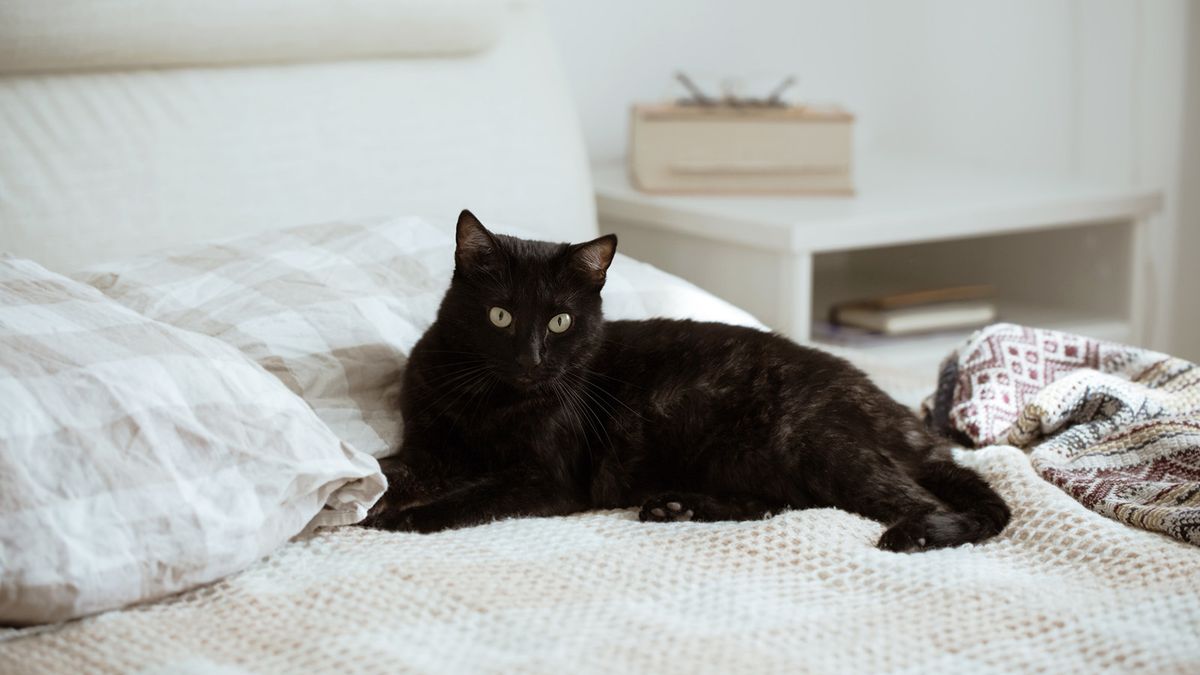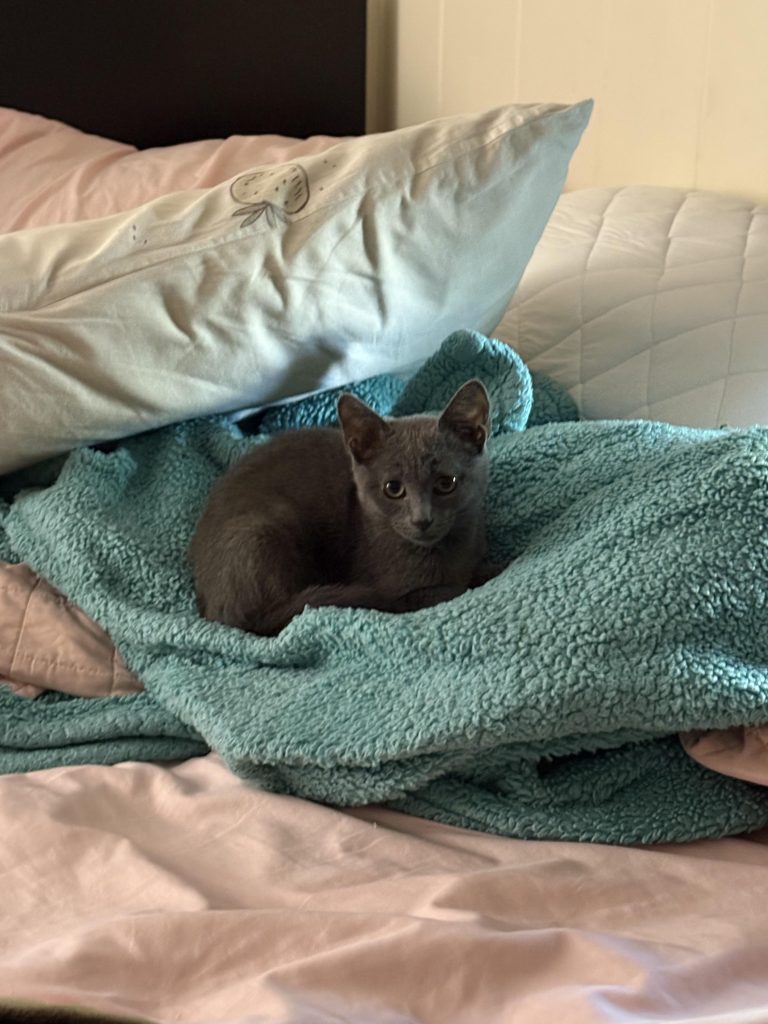Is your cat peeing on your bed, leaving you frustrated and unsure of what to do next? You’re not alone, and the good news is, there are simple steps you can take to stop this behavior for good.
Imagine waking up to a fresh, clean bed every morning, without worrying about unpleasant surprises. You’ll discover easy and effective ways to keep your cat from peeing on your bed, so both you and your furry friend can enjoy a happier, stress-free home.
Keep reading—your bed (and your cat) will thank you!
Reasons Cats Pee On Beds
Understanding why your cat chooses to pee on your bed is the first step to stopping this frustrating behavior. Cats don’t do this without reason. Their actions usually signal something deeper going on, whether it’s health-related or linked to their environment.
Medical Issues
Sometimes, your cat’s bed-wetting points to a health problem. Urinary tract infections, bladder stones, or kidney issues can make it painful or urgent to pee. If you notice this behavior suddenly, a vet visit is crucial to rule out medical causes.
Ignoring medical issues can make the problem worse. Have you ever noticed how your cat acts when in pain? They might hide or become restless, which can help you identify if a health check is needed.
Stress And Anxiety
Cats are sensitive creatures. Changes like moving to a new home, new family members, or loud noises can stress them out. Stress often shows up as peeing outside the litter box, especially on soft places like your bed.
Think about your cat’s routine—has something changed recently? Creating calm, quiet spaces and using pheromone diffusers can soothe anxious cats. What small change could you make to help your cat feel safer?
Territorial Behavior
Cats mark their territory to feel secure. Peeing on your bed might be your cat’s way of saying, “This is mine.” This is more common in multi-cat households where competition for space is high.
Have you noticed any new cats around or changes in your cat’s environment? Providing separate spaces and plenty of vertical areas like cat trees can reduce territorial stress. How well does your cat’s territory meet their needs?
Litter Box Problems
Sometimes, the issue is as simple as litter box troubles. Your cat might find the box dirty, too small, or in a noisy spot. They may also dislike the type of litter used or the box style.
Try cleaning the box more often or adding an extra box in a quiet area. Experimenting with different litter types can make a big difference. Is your cat avoiding the litter box, or is it just inconvenient for them?

Credit: www.reddit.com
Immediate Cleaning Tips
Dealing with cat urine on your bed can feel frustrating, especially when you want your sleeping space to stay fresh and clean. Acting quickly with the right cleaning approach can prevent stains and odors from setting in. Immediate cleaning not only preserves your bedding but also discourages your cat from returning to the same spot.
Choosing The Right Cleaner
Not all cleaners work well on cat urine. Avoid ammonia-based products since their smell can attract your cat back to the same spot.
Look for enzymatic cleaners specifically designed to break down urine proteins. These cleaners target the source of the odor rather than just masking it.
If you don’t have enzymatic cleaners, a mixture of white vinegar and water can work as a temporary solution. Always test any cleaner on a small, hidden area of your bedding first to avoid damage.
Removing Odors Completely
Urine odor is often the reason cats mark the same spot again. Simply washing your sheets might not eliminate the smell your cat can detect.
After applying an enzymatic cleaner, let the area air dry completely. This helps the cleaner work effectively and prevents moisture buildup, which can cause mildew.
Consider sprinkling baking soda on the dry area and vacuuming it up after a few hours. Baking soda absorbs lingering odors and adds an extra layer of freshness.
Have you noticed that even after washing, your cat still targets the same spot? This could mean the odor isn’t fully gone. Taking extra steps to neutralize the smell can stop this behavior for good.
Litter Box Solutions
Addressing litter box issues can stop your cat from peeing on your bed. Cats need a clean, comfortable place to do their business. Sometimes, small changes make a big difference in their behavior.
Optimal Litter Box Placement
Place the litter box in a quiet, low-traffic area. Cats want privacy when they use the box. Avoid noisy spots or places near their food. Keep the box away from loud appliances or busy hallways. A calm spot helps your cat feel safe and relaxed.
Litter Type Preferences
Choose a litter your cat likes. Some cats prefer clumping litter, others like non-clumping. Try unscented litter first, as strong smells can be off-putting. Experiment with textures like fine grains or pellets. Watch your cat’s reaction and switch if needed.
Regular Cleaning Routine
Clean the litter box daily. Scoop out waste at least once a day to keep it fresh. Wash the entire box with mild soap once a week. Dirty boxes can cause cats to avoid them. A clean box encourages your cat to use it consistently.
Behavioral Adjustments
Changing your cat’s behavior can be key to stopping them from peeing on your bed. Cats act out for many reasons, and understanding what drives them helps you guide them toward better habits. Behavioral adjustments focus on creating a calm, engaging, and comfortable environment for your feline friend.
Reducing Stress Triggers
Stress often causes cats to pee outside their litter box. Identify what might be stressing your cat—new pets, changes in routine, or loud noises could be the culprits.
Try to keep your cat’s environment predictable. You might notice that your cat relaxes when you play soft music or maintain a quiet space free from sudden disruptions. Have you ever observed how your cat behaves when visitors come over? Minimizing those stressors can make a big difference.
Providing Enrichment And Play
Sometimes, your cat pees on the bed out of boredom or frustration. Offering toys, climbing trees, and regular playtime keeps your cat’s mind and body active.
Spend at least 15 minutes a day playing with your cat using feather wands or laser pointers. This not only distracts them from unwanted behavior but also builds your bond. Do you notice your cat’s mood improving after play sessions?
Using Pheromone Products
Pheromone diffusers or sprays can help your cat feel more secure and calm. These products release synthetic scents that mimic natural cat calming signals.
Plug a diffuser in the room where your cat spends the most time, or spray bedding areas lightly. Many cat owners find this reduces anxiety-related behaviors quickly. Have you tried pheromone products before, and what was your cat’s reaction?
Protecting Your Bed
Protecting your bed from unwanted accidents is key to keeping your bedroom fresh and comfortable. Cat urine can cause stains and odors that linger, making your personal space less inviting. Taking proactive steps to shield your bed helps maintain a clean environment while you address the root cause of the behavior.
Using Waterproof Covers
Waterproof mattress covers act as a strong barrier between your cat’s accidents and your mattress. These covers are easy to clean and prevent liquids from soaking in, saving you from tough stains and odors.
Choose covers made of breathable materials so you stay comfortable at night. Some come with zippers, making removal and washing simple.
Think about how often you currently clean your bedding. Adding a waterproof layer can reduce the frequency of deep cleans, saving you time and effort.
Restricting Bedroom Access
Keeping your cat out of the bedroom can stop accidents before they happen. If your cat doesn’t have access to your bed, it simply can’t pee there.
Use baby gates or close doors to create a boundary your cat respects. If your cat scratches or meows to enter, try adding appealing distractions elsewhere, like cozy beds or toys in other rooms.
Have you noticed if your cat’s accidents happen mostly when you’re asleep or away? Limiting bedroom access during these times might reduce incidents and give you peace of mind.

Credit: www.petscare.com
When To See A Vet
Noticing your cat peeing on your bed can be frustrating, but it might signal more than just behavioral issues. Sometimes, it’s a red flag that your cat needs medical attention. Knowing when to see a vet can save your cat from discomfort and prevent ongoing problems.
Identifying Health Symptoms
Look closely at your cat’s behavior and physical signs. Is your cat straining to urinate or crying out in pain? These can be signs of a urinary tract infection or bladder stones.
Other symptoms to watch for include frequent trips to the litter box with little output, blood in the urine, or excessive licking of the genital area. These are clear signals your cat may be in distress and needs a vet’s help.
If your cat suddenly starts peeing outside the litter box and shows any of these symptoms, don’t delay. Ignoring these signs can lead to serious health complications.
Discussing Treatment Options
Once you’ve identified that your cat needs veterinary care, your vet will discuss treatment based on the diagnosis. Treatments could range from antibiotics for infections to special diets for bladder health.
Sometimes, behavior modification combined with medication is necessary. Your vet might recommend changes to litter type, cleaning routines, or stress reduction techniques along with medical treatment.
Remember, treating the underlying health issue often stops the unwanted peeing. Have you thought about how a quick vet visit could save your cat from ongoing discomfort?

Credit: animals.howstuffworks.com
Frequently Asked Questions
Why Does My Cat Pee On My Bed?
Cats may pee on beds due to stress, illness, or litter box issues. It’s a sign they’re uncomfortable or anxious. Checking their health and litter box cleanliness often helps solve this problem quickly.
How Can I Stop My Cat From Peeing On My Bed?
Keep your cat’s litter box clean and accessible. Use enzymatic cleaners to remove odors from the bed. Provide stress relief with toys and a calm environment to prevent repeat incidents.
Can Health Problems Cause My Cat’s Bed Peeing?
Yes, urinary tract infections or bladder issues often cause inappropriate urination. If your cat suddenly pees on the bed, a vet visit is crucial to rule out health concerns.
What Cleaning Products Remove Cat Urine Odors Effectively?
Use enzymatic cleaners specifically designed for pet urine. These break down odor-causing molecules and prevent repeat marking. Avoid ammonia-based cleaners as they can attract cats back to the spot.
Conclusion
Keeping your cat from peeing on the bed requires patience and understanding. Identify triggers causing this behavior. Provide a clean, comfy litter box. Reward good behavior with treats. Ensure your cat feels safe and secure. Consider vet advice if the issue persists.
Remember, each cat is unique. Find what works best for yours. Consistency is key. With time and care, you can solve this issue. Enjoy a peaceful home with your furry friend.

